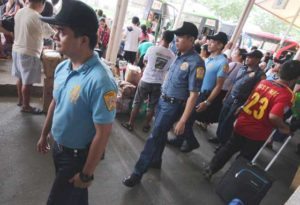GOVERNMENT forces have launched a manhunt for four “persons of interest” who may have had a hand in the Davao City night market bombing that killed 14 people and injured dozens.
Director General Ronald “Bato” de la Rosa, chief of the Philippine National Police (PNP), disclosed on Saturday night that security forces were looking into the involvement of two females and a male, who witnesses said could have planted and detonated the improvised explosive that tore through the bustling market at the heart of Davao city Friday night.
He did not disclose other details, but said authorities, particularly intelligence personnel, were cross-matching the persons’ identities with a list of 10 wanted terrorists.
The head of Davao police on Sunday described how a man was seen leaving a bag with the bomb inside at the market while being followed by two women.
Police are searching for the three—and possibly a fourth person—over the bombing, which has been widely blamed on the terrorist Abu Sayyaf group.
Sr. Supt. Michael John Dubria told reporters the man had gone for a massage in the market and left the bag in that area.
“We believe the improvised explosive device exploded when the person left,” he said, adding that the two women had been following the man.
Another person may have detonated the device with a cellular phone, he suggested.
He would not say who was behind the blast but said the bomb, using a mortar shell, was similar to those used by “threat groups” in the troubled central region of Mindanao.
Chief Insp. Andrea de la Cerna, spokeswoman of a task force investigating the explosion, said they were not ruling out other motives for the attack.
“We have copies of the CCTV (closed-circuit television), we have eight possible witnesses but we have named no one [as suspects],” she told AFP.
More weight on Sayyaf angle
The PNP is giving more weight on the suspected involvement of the terrorist Abu Sayyaf Group in the blast, but is also looking at the angle of a business dispute over the distribution of stalls at the night market on Roxas Avenue, de la Rosa said.
Illegal drug traders may have also been involved, said Col. Edgard Arevalo, chief of the Armed Forces of the Philippines (AFP) Public Affairs Office, in an interview.
Arevalo noted that based on the assessment of the Davao Regional Peace and Order Council and chiefs of city and provincial police offices, “there is a big probability that the Abu Sayyaf is the main suspect.”
“But no one is concluding that it was indeed the Abu Sayyaf or businessmen. The bottomline is the investigation is ongoing to determine conclusively if the Abu Sayyaf was involved, or businessmen due to the inequitable distribution of stalls,” he said.
Flip-flop
Arevalo pointed out that the Abu Sayyaf had flip-flopped on its statement claiming responsibility for the Davao City bombing.
“They admitted it earlier only to retract and pointing to their ally as responsible. Then, later in the day, they claimed it again,” he said.
The Philippine Army’s 3rd Infantry Division, covering Western and Central Visayas, has declared a red alert “in compliance with President Rodrigo Duterte’s call for the state of lawless violence.”
Earlier, the AFP’s Eastern Mindanao Command, Western Mindanao Command and the government’s anti-coup force, the Joint Task Force NCR, declared a red alert status following the blast.



